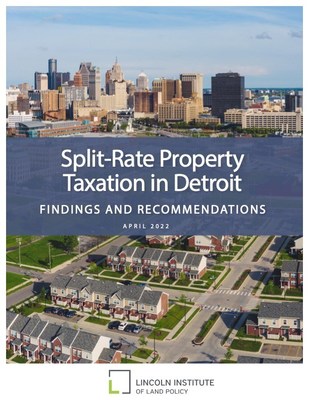Taxing Land More Than Buildings Would Help Detroit Homeowners and Spur Development
CAMBRIDGE, Mass., April 4, 2022 /PRNewswire/ — Reforming Detroit’s assets tax program by taxing land at a better fee than properties would enable to revive the neighborhood overall economy and decrease tax costs for practically each individual home-owner, according to a new analyze from the nonprofit Lincoln Institute of Land Coverage.
With the lowest assets values of any massive U.S. city and some of the optimum house tax charges, Detroit is caught in a decades-extensive cycle of soaring tax fees that continue to fall short to create ample profits. In the absence of robust general public services, large residence taxes improve proprietor expenses, minimize residence values, and boost the expenditures of maintenance and redevelopment, creating a drag on financial recovery.
Like numerous economically distressed metropolitan areas, the town copes with this challenge by featuring generous tax abatements for new progress and for some property owners. Abatements relieve extra prices and quickly elevate residence values, but they can only be offered to a compact set of citizens and new corporations. This leaves high—sometimes destabilizing—tax payments in place for extended-phrase homeowners. While superior taxes continue being on most properties and enterprises, inclusive and lasting incentives for reinvestment are absent.
A better tax charge for land than for structures—known as “break up-price” due to the fact there are two unique tax rates—would deal with the trouble extra effectively and distribute the advantages a lot more equitably.
The new review, Break up-Amount Home Taxation in Detroit: Results and Tips, finds that taxing land at five periods the fee for structures would consequence in lessen tax expenses for 96 % of householders, with an common financial savings of about 18 percent. Less than a revenue neutral reform, tax price savings would be absolutely offset by tax improves on vacant and underutilized property.
“By adopting a split-fee residence tax, Detroit can make its tax method both extra economical and a lot more equitable,” stated John Anderson, an economist at the University of Nebraska, Lincoln, and direct creator of the examine. “Efficiency is enhanced by eradicating the tax-linked obstacles to money enhancements and progress. Fairness is increased by a reduction in taxes for the broad the vast majority of household householders.”
“Splitting the home tax provides lengthy-time Detroiters with the tax aid that new organizations and residents currently acquire,” stated co-writer Nick Allen, former supervisor of approach and coverage for the Detroit Economic Development Company and now a doctoral prospect at the Massachusetts Institute of Technological know-how. “Our study displays that it is an successful, quick way to completely lessen burdens on overtaxed households and restore house wealth. It really is not ample, but it is a essential stage in direction of racially equitable recovery.”
In addition, a split-price tax improves the cost of keeping vacant land and lessens the charge of producing it, or of renovating deteriorated buildings. Lessened tax burdens and accelerated financial commitment direct to an common maximize of 12 per cent in the value of residential residence and an maximize of 20 % for business property. In a supporting technical paper, the challenge crew also located that the proposed 18 % reduction in residential taxes would decrease residential tax foreclosures by at the very least 9 percent.
“Implementation of a split-rate tax in Detroit provides an chance to strengthen the home tax program by escalating efficiency, and reducing assets tax inequities and tax foreclosure,” explained Michigan State College economist Mark Skidmore, a co-author of the analyze.
Commissioned by Devote Detroit with assist from The Kresge Foundation, the analyze analyzes knowledge from municipalities in Pennsylvania that have implemented spit-charge taxes, as properly as genuine estate and home tax facts from Detroit. In addition to Anderson, Allen, and Skidmore, the study’s co-authors incorporate Fernanda Alfaro of Michigan Condition College, Andrew Hanson of the College of Illinois at Chicago, Zackary Hawley of Texas Christian College, Dusan Paredes of Northern Catholic University in Chile, and Zhou Yang of Robert Morris University.
“If we are to continue on the momentum of Detroit’s constructive, equitable advancement, we ought to renovate our home tax construction to ease the load on bulk Black owners and neighborhood builders,” said Dave Blaszkiewicz, president and CEO of Make investments Detroit. “This report gives a remedy that accomplishes that even though also disincentivizing blighted and underutilized attributes that hinder Detroit’s development.”
“With this examination, Make investments Detroit has elevated an equitable solution to taxation that can provide a lot-necessary relief to tax-burdened Detroiters while encouraging investment decision and progress. This is a well timed idea that addresses an urgent problem, and the extremely regarded Lincoln Institute of Land Coverage has now provided a strong framework for neighborhood conversations,” reported Wendy Lewis Jackson, managing director of Kresge’s Detroit Program.
The team also manufactured 3 technical papers to assist the study: “Assessment of House Tax Reductions on Tax Delinquency, Tax Foreclosure, and Dwelling Ownership,” “Break up-Level Taxation and Enterprise Establishment Area Evidence from the Pennsylvania Expertise,” and “Split-Level Taxation: Impacts on Tax Base,” all published by the Lincoln Institute.
The examine is offered for obtain on the Lincoln Institute’s website: https://www.lincolninst.edu/publications/other/break up-charge-residence-taxation-in-detroit
The Lincoln Institute of Land Coverage seeks to make improvements to excellent of existence by way of the successful use, taxation, and stewardship of land. A nonprofit private operating basis whose origins day to 1946, the Lincoln Institute researches and suggests creative techniques to land as a resolution to economic, social, and environmental difficulties. By way of education and learning, education, publications, and events, we combine theory and follow to advise community plan conclusions around the world.
![]() Check out unique content material to download multimedia:https://www.prnewswire.com/news-releases/new-report-taxing-land-extra-than-structures-would-support-detroit-householders-and-spur-growth-301516877.html
Check out unique content material to download multimedia:https://www.prnewswire.com/news-releases/new-report-taxing-land-extra-than-structures-would-support-detroit-householders-and-spur-growth-301516877.html
Resource Lincoln Institute of Land Plan









